Indonesian Beverages: Basic Overview
Common Ingredients
Common Preparing Methods
Key Taste
Drinking Etiquette
Culinary Festivals
Influence and Fusion
Classifications of Indonesian Beverages
-
Alcoholic Beverages
Indonesian alcoholic beverages showcase a rich diversity, stemming from various local ingredients and traditional fermentation and distillation methods.
These beverages range from mildly intoxicating to quite potent, with alcohol contents that vary widely.
Ingredients like the sap of palm trees, rice, and sugarcane molasses are commonly used.
Some beverages are integral to cultural and religious ceremonies. The flavors can vary greatly, from sweet and tangy to robust and earthy
-
Non-alcoholic Beverages
Indonesia’s non-alcoholic beverages encompass a wide array of herbal teas, fruit juices, and other traditional beverages.
Ingredients such as ginger, palm sugar, coconut milk, and a variety of tropical fruits are staples.
These beverages are often served during special occasions, as a daily refreshment, or as part of a meal.
From hot, soothing teas to cool, sweet juices, the non-alcoholic beverage spectrum in Indonesia caters to all palates and dietary needs, including those looking for vegan or vegetarian options.
Indonesian beverages are a flavorful compilation of drinks available in the country. Stretching over 6,000 inhabited islands, Indonesian cuisine combines various regional beverages.
These influences include neighboring Malaysia and Singapore, as well as Dutch and Chinese culinary traditions.
Despite being an Islamic country where alcohol consumption is less common, a variety of alcoholic beverages can still be found in bustling cities and tourist hotspots.
The nation uses abundant fruits and spices, offering flavorful, aromatic, and warm beverages, often sweetened with palm sugar, honey, syrup, or condensed milk. Plus, you’ll notice that many iced beverages and other beverages double as desserts or snacks.
Moreover, you’ll find several insights about traditional drinking practices and the global charm of Indonesian drinks in this article. Next, I’ll explore popular alcoholic and non-alcoholic Indonesian beverages.
I’ll shed light on their history, the country’s alcohol regulations, and the perfect food pairings for these tantalizing beverages.
Presented here are 28 highly favored Indonesian beverages, ordered by their popularity:
28 Popular Indonesian Beverages with Filters
Get ready to dig into 28 popular beverage choices from Indonesia! For those looking for quick information, filter options can help you.
This overview also highlights key aspects of traditional, national, fusion, or street drinks in Indonesia.
Es Teler, a refreshing and fruity ice dessert drink, is considered a national beverage of Indonesia.
The streets of Indonesia are commonly refreshing options like es kelapa muda (young coconut water), es teler, and several kinds of fruit juices.
Indonesian Tea
- Non-Alcoholic
- Street Beverages
- Traditional
Indonesian tea (teh) was from China before it arrived in Indonesia from Japan in the 1680s. By the 1830s, tea plantations flourished, sparking a cultural tea revolution.
Now, black tea reigns as Indonesia’s favorite, savored hot, and cold, with or without sugar. You can find tea in different flavorful forms like Teh Manis Panas, simply hot tea sweetened with sugar, and Teh Poci, hot tea served in a clay pot, sweetened with rock sugar.
Plus, you can find the creamy Teh Tarik, a Malaysian-origin milk tea, and the unique Teh Talua, hot tea blended with sugar and egg yolks, a favorite in West Sumatra. Finally, for those hot days, there’s Liang Teh, a sweet iced tea delighting taste buds in Medan, North Sumatra.
Indonesian Coffee
- Non-Alcoholic
- Street Beverages
- Traditional
Indonesian coffee, or kopi, is a product of Dutch traders bringing coffee from its Ethiopian roots, arriving in the Indonesian archipelago in the late 17th century.
Today, Indonesia is among the world’s top coffee producers due to its rich volcanic soil and the ideal climate, boasting Arabica and Robusta beans.
Indonesian coffee is favored for its high quality and diverse flavors, low acidity, and notes of spices. The wet preparation process ensures a cleaner and more consistent flavor, with Java being a popular coffee variety.
Kopi also has a few intriguing variants, like Kopi Tubruk, coffee steeped in hot water without straining, and Kopi Joss, prepared with a piece of burning charcoal to create a smoky flavor.
In addition, Kopi Luwak (civet coffee) is the world’s most expensive coffee, as is Kopi Sanger, which is black coffee with sugar and condensed milk. Then, there’s Kopi Talua, coffee with egg yolks.
A noteworthy mention is Kopi Tarik featuring dark roasted coffee with margarine, sugar, and condensed milk, literally meaning “pulled coffee”.
Jus
- Non-Alcoholic
- Street Beverages
- Traditional
Jus, the Indonesian term for fruit juice, is a drink that makes use of the abundant fruits in the country.
You can easily find jus buah naga, a refreshing draught of dragon fruit juice, and jus alpukat, a surprising blend of avocado juice with chocolate condensed milk. Plus, there’s jus rumput laut, a unique seaweed juice.
Additionally, you shouldn’t miss jus martabe, a vibrant blend of passion fruit and tamarillo juice. Served with ice, these juices provide an excellent counterpoint to Indonesia’s hot weather and can be found almost anywhere you go.
Es Kelapa Muda
- Non-Alcoholic
- Street Beverages
- Traditional
Es kelapa muda, also known as es degan, is a refreshing Indonesian beverage made with young coconut ice. The main ingredients include coconut water, young coconut flesh, sugar syrup or honey, and spices.
Certain locales, such as Semarang, even toss in jackfruit and tapai, a fermented starchy food, for a unique twist. Served cold or chilled in a coconut shell, es kelapa muda is available across Indonesia.
Given its popularity, es kelapa muda was recognized by CNN as one of the world’s 50 most delicious beverages in 2011.
Es Teler
- Non-Alcoholic
- National
- Street Beverages
- Traditional
Es teler is a delightful Indonesian fruit cocktail known for its refreshing and diverse mix of ingredients. It typically includes avocado, coconut meat, grass jelly, and jackfruit, all soaked in a sweet and creamy blend of coconut milk and condensed milk.
This beverage is often flavored with the aromatic Pandanus amaryllifolius leaf, commonly in the form of cocopandan syrup, and is subtly enhanced with a dash of sugar and salt.
The creation of es teler is attributed to Murniati Widjaja, who crafted this concoction for a competition aimed at finding a national beverage for Indonesia in 1982, where it emerged victorious.
Bir Bintang
- Alcoholic
- Street Beverages
Bir Bintang is the most renowned beer hailing from Indonesia. Also, the phrase “Bir Bintang” translates to “star” in Indonesian. Produced by PT Multi Bintang Indonesia, the brewery is a Heineken subsidiary that has been brewing this golden pale lager since 1929.
In addition, Bir Bintang shares some familial traits with Heineken in taste and its bottle design. This light beer presents a mild hoppy flavor, followed by a crisp, refreshing aftertaste. With an alcohol by volume of 4.7%, Bir Bintang is a well-balanced choice for casual occasions.
Jamu
- Non-Alcoholic
- Street Beverages
- Traditional
Jamu is a traditional herbal beverage from Indonesia that is a smooth blend of various roots, herbs, and spices with water, honey, fruits, and flowers. Preparation involves blending these ingredients, then boiling them to extract the beneficial compounds and adding other ingredients.
Usually, jamu has a bitter-sweet taste coming from ingredients like ginger, kencur, sapanwood, turmeric, Indonesian cinnamon, fennel, tamarind, and limes. In 2019, jamu was recognized as one of Indonesia’s intangible cultural heritage.
Today, jamu is readily available, whether at grocery stores, supermarkets, or from local hawkers, and can be found in forms as diverse as powders, pills, or ready-to-drink beverages.
Anggur Merah
- Alcoholic
- Traditional
Anggur Merah is a wine steeped in Indonesian tradition. Known alternately as Amer, this red wine, which the name literally translates to, has an average alcohol volume (ABV) of about 20%.
Interestingly, Anggur Merah is classified as Djamu, a traditional medicine, so it can be suitable for Muslims as a healthy drink. The most famous brand associated with Angguer Merah is Cap Orang Tua.
Arak
- Alcoholic
- Traditional
Arak is a distinct spirit with roots that trace back to the Middle East. Also known as araq, it is popular across South Asia and Southeast Asia, including Indonesia.
It is crafted by fermenting the sap of the coconut or palm tree for several days before distilling the liquor. In the Middle East, this beverage is anise-flavored, while Indonesian arak could be derived from coconut sap, sugarcane, brown rice, and other sources.
Once called tuak by Indonesians, arak has a higher alcohol content, ranging from 20% to 50%.
The clear spirit makes arak suitable for neat sipping or cocktail creations. The island of Bali is particularly fond of this beverage, offering it at numerous resorts and bars.
Some believe Mongolian invaders facilitated Arak’s arrival on Indonesian shores during the Majapahit era.
Arak earned the status of Indonesian Intangible Cultural Heritage in 2021, and Bali arak even appeared at the 2022 G20 Bali Summit as a souvenir for attendees. Despite its name, it’s unrelated to arrack, another distilled alcohol.
Wedang Jahe
- Non-Alcoholic
- Street Beverages
- Traditional
Wedang Jahe is a traditional herbal tea from Indonesia, characterized by its heartwarming blend of ginger, water, palm sugar, pandan leaves, and cinnamon. You can add a splash of condensed milk for creaminess.
The preparation involves gently simmering ginger and spices in hot water, resulting in a soothing brew. Wedang Jahe is closely related to Wedang Secang, another Indonesian herbal tea that swaps ginger for sapanwood shavings, also known as secang.
Both beverages share a similar sweet and warm profile, offering comfort that resonates with the body and soul.
Bajigur
- Non-Alcoholic
- Street Beverages
- Traditional
Bajigur is a West Java hot beverage in Indonesia. As a popular option of Sundanese cuisine, the blend is affectionately known as a Sundanese coconut latte.
The concoction is a warm blend of coconut milk, palm sugar, ginger, pandan leaves, or vanilla. Alternatively, you can put optional ground coffee or grated coconut.
Unlike a conventional latte, bajigur is always served hot. The best part is that bajigur pairs perfectly with traditional Indonesian snacks such as boiled sweet potatoes, steamed bananas, or boiled peanuts.
Bandrek
- Non-Alcoholic
- Street Beverages
- Traditional
Bandrek is a sweet and spicy traditional hot beverage from West Java, Indonesia. The signature blend consists of ginger, palm sugar, water, and a hint of condensed or coconut milk.
But what makes bandrek truly special are the cinnamon and other spices, known for their warming qualities. Some unique recipes even include additions like grated coconut or durian.
Always served hot, bandrek is ideal for cold nights or rainy days. This fragrant beverage is also known to soothe a sore throat, offering an enjoyable wellness benefit with every sip.
Beras Kencur
- Non-Alcoholic
- Street Beverages
- Traditional
Beras Kencur is a traditional Indonesian herbal beverage brimming with a distinctive blend of rice and a unique herb called Kencur or aromatic ginger (Kaempferia galangal). This beverage’s warm, rich sweetness is crafted by boiling together ingredients.
Commonly, locals make use of elements such as rice, kencur, tamarind, ginger, and palm sugar, which offer a great source of antioxidants. Whether served warm or chilled, Beras Kencur remains a cherished part of the Indonesian traditional herbal medicine, Jamu.
Beras Kencur is available in conveniently packaged forms, making it easier for everyone to savor this Indonesian concoction.
Sekoteng
- Non-Alcoholic
- Street Beverages
- Traditional
Sekoteng is a non-alcoholic beverage in Java that hails from Indonesia. This warming beverage comes with ginger, peanuts, bread, green beans, and, occasionally, pearl tapioca.
Locals often prepare sekotend by simmering ginger and peanuts in water before dicing in bread and other ingredients.
As a ginger-infused beverage, sekoteng offers a comforting warmth, making it a preferred choice during winter. Commonly, sekoteng is a staple among street vendors who sell the beverage hot during nighttime.
Wedang Ronde
- Non-Alcoholic
- Street Beverages
- Traditional
Wedang Ronde is an Indonesian dessert originating from China, specifically mirroring the Chinese Tangyuan. The recipe features main ingredients such as sticky rice, ginger, water, sugar, toasted peanuts, tapioca pearls, coconut shavings, and pandan leaves.
Plus, the dessert comes with sticky rice balls, some even filled with sugar and peanuts, simmered in a sweet ginger syrup, making it a popular treat in Java. This aromatic beverage has many colors. In terms of meaning, “Ronde” refers to the word round in Dutch.
Wedang Uwuh
- Non-Alcoholic
- Traditional
Wedang uwuh is a unique herbal tea from Java, Indonesia, and has a special association with the province of Yogyakarta. In addition, wedang uwuh literally translates to “trash drink”.
The name reflects wedang uwuh’s creative use of ‘discarded’ elements like fallen leaves from spices such as nutmeg, cinnamon, cardamom, and more, coupled with sappanwood, ginger, rock sugar, and water.
Wedang uwuh has a sweet, warm flavor and a pleasant aroma that complements its bright red color. This special beverage is now sold in various forms, including teabags and syrups.
Brem
- Alcoholic
- Traditional
Brem is a traditional fermented beverage from Indonesia, known for its sweet and tangy profile.
Crafted from sticky rice, locally known as Kentai, and tapai, a dry starter, the preparation process involves cooking the rice before incorporating it with tapai.
Later on, the mixture is introduced with yeast for fermenting at least two weeks. This fermentation brings brem to life, with an alcohol by volume (ABV) ranging from 5% to 14%.
Surprisingly, brem has a solid, cake-like version enjoyed as a snack.
Tuak
- Alcoholic
- Traditional
Tuak is an alcoholic beverage in Indonesia that is well-known around the world. Known by various names such as sopi, or palm feni, tuak is made by fermenting the sap of palm trees, predominantly from coconut trees.
In the Indonesian context, the term “tuak” refers to naturally fermented alcoholic beverages, including palm wine or even beverages derived from fermented rice. Created around the 14th century or earlier, tuak has gained popularity in the Batak community of North Sumatra.
The beverage boasts alcohol by volume (ABV) of about 8%. Plus, Tuak plays a pivotal role in festivals, holidays, and religious ceremonies.
Ciu
- Alcoholic
- Traditional
Ciu is a unique spirit hailing from Java, Indonesia. First appearing during the Dutch colonial era, this clear spirit is associated with towns such as Banyumas, Bekonang, and Solo.
Usually, ciu’s flavor comes from ingredients like sugarcane molasses or cassava. Also, the alcohol content of ciu varies from 25% to 70%, creating a mellow or potent pour.
As a mixer, ciu is favored with soft beverages like Sprite, Coca-Cola, and even tamarind juice.
Batavia Arrack
- Alcoholic
- Traditional
Batavia arrack is an alcoholic beverage originating from Indonesia. Locals have enjoyed Batavia arrack since the early 17th century, making it the most popular liquor today.
Named after the Dutch colonial name for Jakarta, this Indonesian variant of Arrack is often called Arak, which can cause some confusion. Made from a blend of red rice, sugarcane, and molasses, Batavia Arrack boasts a distinct taste reminiscent of dark rum.
The spirit has a relatively high alcohol by volume (ABV) of 70%. Before the arrival of rum, Batavia Arrack was even used to make punch, with Batavia Arrack van Oosten being the most popular brand of this alcohol.
Dadiah
- Alcoholic
- Traditional
Dadiah is a fermented milk beverage native to Indonesia and popular in West Sumatra. The drink is prepared by fermenting buffalo milk in a bamboo tube at room temperature for at least two days, producing in a creamy texture and a sharp, sour taste.
Additionally, further fermentation only makes dadiah denser and tangier. Interestingly, the price of dadiah intriguingly relies on the length and diameter of the bamboo tube used for preparation.
This beloved breakfast beverage is typically paired with steamed rice or Sambal, an Indonesian chili sauce. Moreover, dadiah often forms part of a traditional dish known as Ampiang dadiah, where Ampiang, or sticky rice flakes, are topped with dadiah and palm sugar.
Lahang
- Non-Alcoholic
- Traditional
Lahang is a non-alcoholic beverage of West Java, Indonesia, and plays a key role in Sundanese cuisine. The beverage features the sap of the aren or sugar palm tree for a sweet flavor when served cold.
To produce lahang, the male flowers of sugar palm trees are carefully tapped using bamboo containers. Then, the collected sap is chilled before consumption.
But be cautious, as the sap can start fermenting if left at room temperature for too long. Interestingly, lahang is the same sap that serves as an ingredient for Tuak and palm sugar.
Susu Telur Madu Jahe
- Non-Alcoholic
- Traditional
Susu Telur Madu Jahe is a non-alcoholic beverage from Indonesia that combines a delicious mix of milk, ginger, honey, and egg.
Also known as STMJ, Susu Telur Madu Jahe is simply a combination of the main ingredients in Indonesian, featuring Susu for milk, Telur for egg, Madu for honey, and Jahe for ginger.
Commonly, preparing homemade STMJ involves simmering ginger in milk and blending all ingredients until a frothy mixture is achieved.
Serbat
- Non-Alcoholic
- Traditional
Serbat is a Persian non-alcoholic refreshment blending simple syrup, water, and various fruits. Although you can use almost any fruit to create this beverage, serbat blewah, made with shredded cantaloupes, stands out as the most popular variety.
In addition, the cold, sweet, fruity taste makes serbat well received, especially in Java and several Muslim countries.
This makes serbat a top choice during Ramadan, when refreshing beverages like serbat, and laksamana mengamuk, a beverage from Riau Province in Sumatra made of ripe mangoes, coconut milk, and sugar, are in high demand.
Sara’ba
- Non-Alcoholic
- Traditional
Sara’ba, or sarabba, is a non-alcoholic beverage native to Sulawesi, Indonesia. With ingredients such as ginger, water, palm sugar, coconut milk, lemongrass, cloves, and cinnamon, Sara’ba has a sweet and spicy flavor.
While similar to bandrek and bajigur regarding ingredients, Sara’ba is unique, often adored in Makassar for pairing with fried bananas. Egg yolks are sometimes added, but it’s just as delicious without them.
Air Guraka
- Non-Alcoholic
- Traditional
Air guraka is a sweet, aromatic beverage rooted in Indonesia. This easily prepared and inexpensive beverage is a vibrant blend of ginger, water, lemongrass, palm sugar, and roasted peanuts or walnuts.
The combination of these ingredients results in a distinctive and refreshing flavor profile. Especially well-regarded in the northern Moluccas, air guraka has become a staple at street food stalls.
Bir Pletok
- Non-Alcoholic
- Street Beverages
- Traditional
Bir pletok is a non-alcoholic beverage of the Betawi people in Jakarta, Indonesia. Inspired by Dutch wines and beers, Bir Pletok is a twist suitable for Muslims.
Though the term “bir” implies “beer”, this beverage is completely alcohol-free. The vibrant red drink offers a sweet, slightly spicy flavor from a combination of water, sugar, ginger, lemongrass, pandan leaves, sappanwood, and spices.
Traditionally, bir pletok is served warm at night and plays a special role in Betawi culture, such as circumcisions, weddings, and funerals.
Bandung
- Non-Alcoholic
- Traditional
Bandung is a non-alcoholic beverage that originated in Singapore but has spread to Indonesia, Malaysia, and Brunei. Commonly, people call bandung by several names, such as air bandung, sirap bandung, and rose syrup beverage.
The mix is made with a delightful combination of evaporated or condensed milk and rose syrup, resulting in a distinctive pink color. The Indonesian version, soda gembira, adds a carbonated soft beverage to the mix, giving it a fizzy twist.
Chilled and served with ice, bandung is a preferred beverage for Ramadan and weddings. This sweet, milky flavor beverage pairs well with traditional Indonesian dishes like bakso, soto, nasi goreng, and rendang.
What’s The History of Indonesian Beverages?
Indonesia’s rich and diverse beverage culture has been shaped by the following influences:
These encounters have aided the popularization of Indonesian beverages in other countries and vice versa, contributing to a vibrant and diverse beverage culture in the region.
What to Know About Alcoholic Regulation in Indonesia?
Alcoholic regulation in Indonesia is shaped by a mix of 5 main factors below:
What Indonesian Beverages Pair Well with Dishes?
Here’s how some popular Indonesian beverages can pair with various dishes to enhance your dining experience:
Each beverage brings out different facets of famous dishes from Indonesia, from cutting through richness with acidity or effervescence, balancing spiciness with sweetness or warmth, or simply complementing the meal’s flavors with herbal or fruity notes.
If you’re as excited about the vibrant world of Indonesian beverages as I am, show your support by sharing this article with your friends. Do you have a favorite Indonesian beverage or a pairing suggestion? Drop it in the comments below.
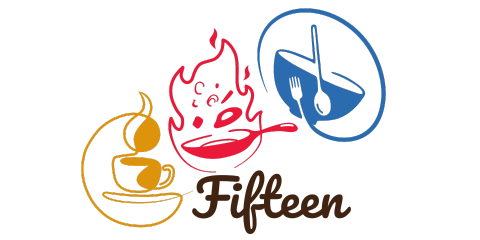

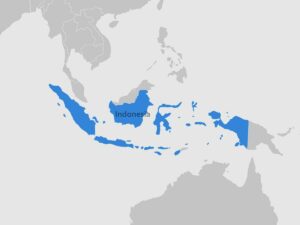

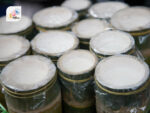

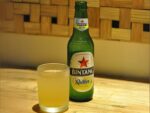
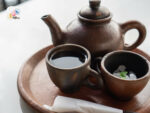
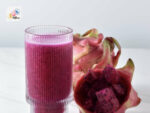


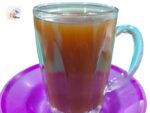

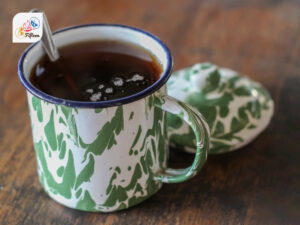
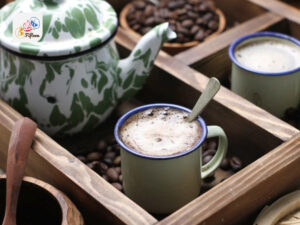
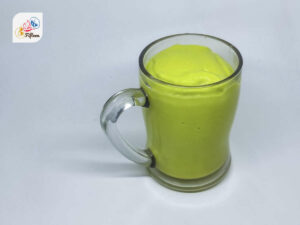
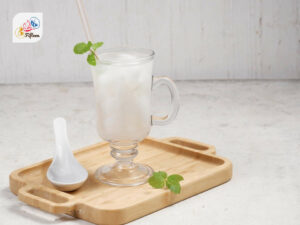
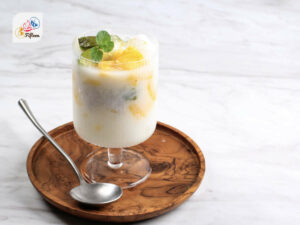
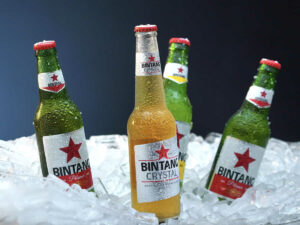
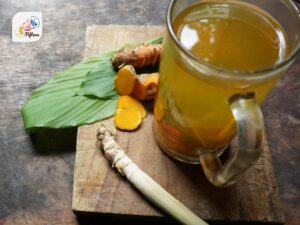
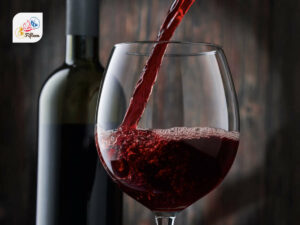
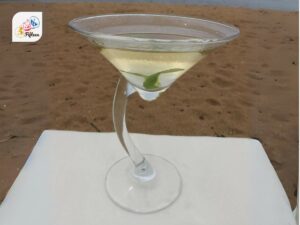
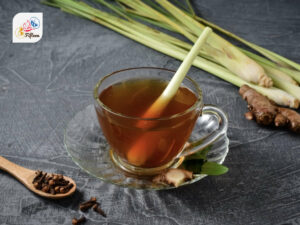
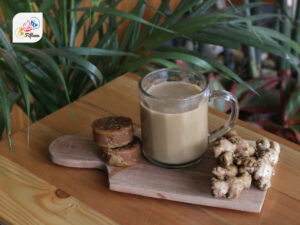
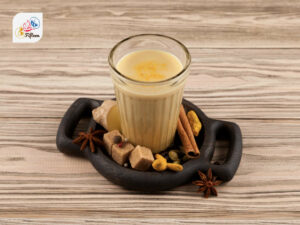
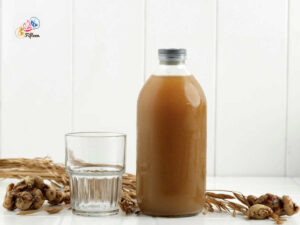
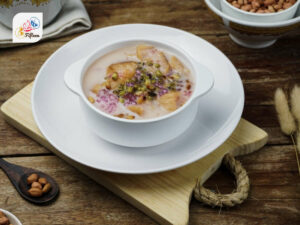
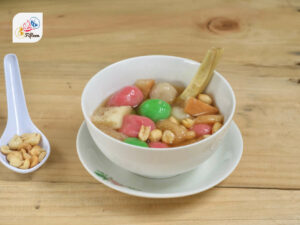
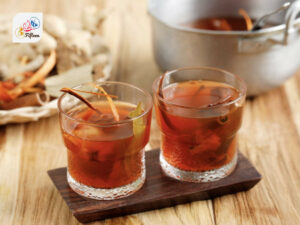
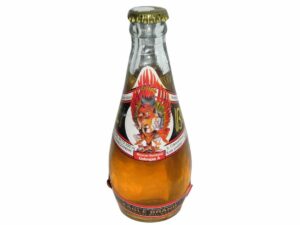
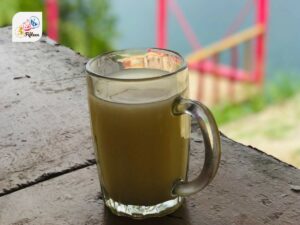
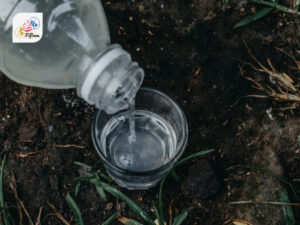
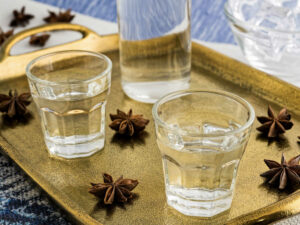
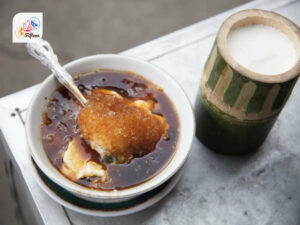
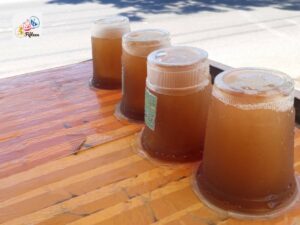
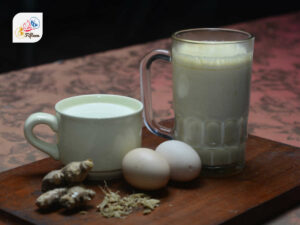
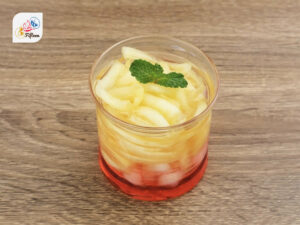
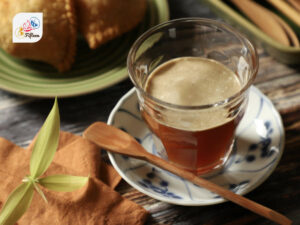
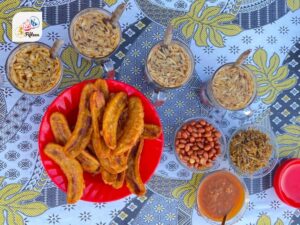
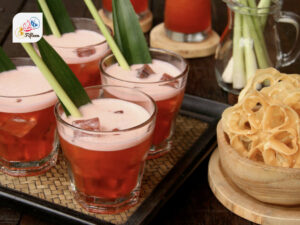
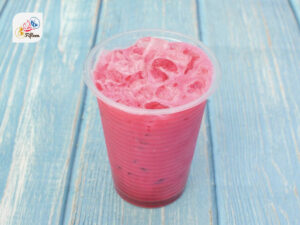
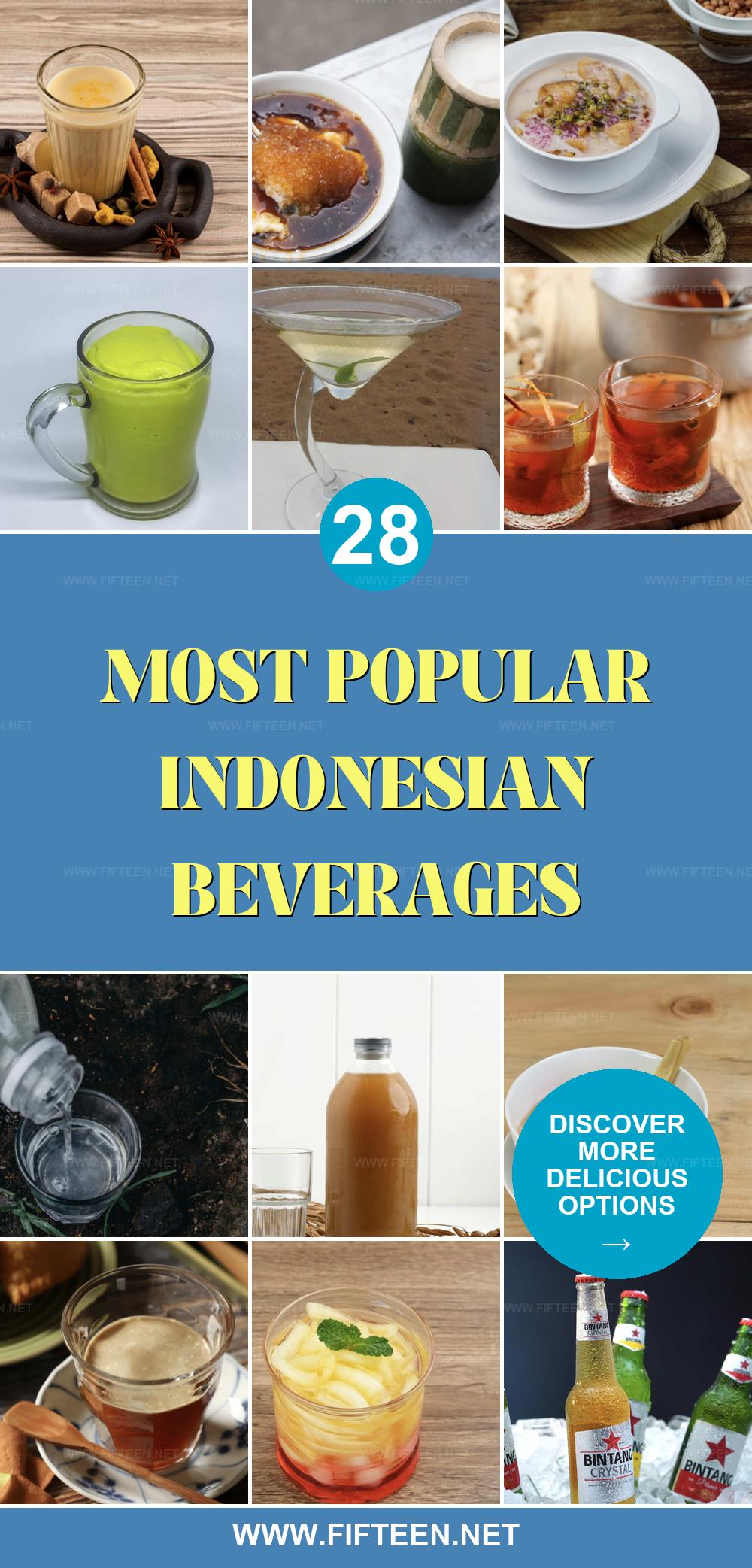
Jamie Scott
Editor in Chief, Senior Content Writer
Expertise
Home Cooking, Meal Planning, Recipe Development, Baking and Pastry, Food Editor, Cooking-video Maker, Western Food Evaluation Expert
Education
Le Cordon Bleu College of Culinary Arts
Local Community College, New York, NY
Jamie Scott is a skilled culinary expert and content creator specializing in Western cuisine. With over 15 years in the culinary field and formal training from Le Cordon Bleu, Paris, Jamie deeply understands how to blend nutrition with delicious flavors. His passion for cooking matches his commitment to making healthy eating accessible and enjoyable.
On Fifteen.net, Jamie brings a fresh perspective to classic dishes and beverages, offering readers insightful recipes, cooking tips, and a fresh view on meal planning that emphasizes taste, health, and simplicity.